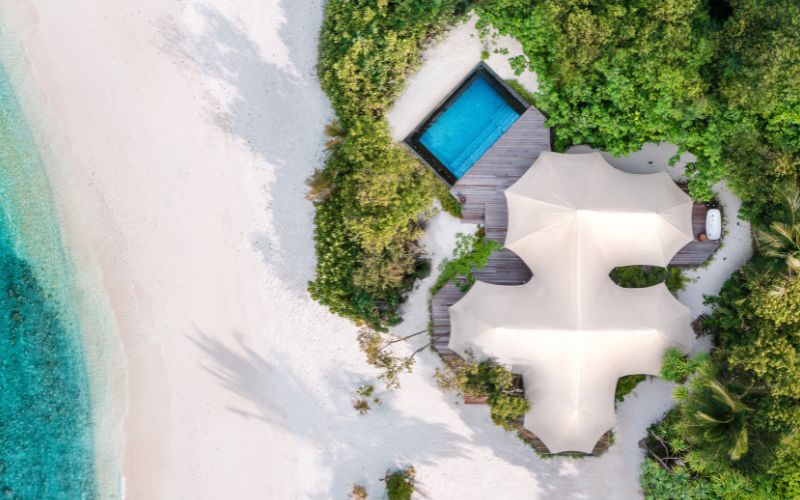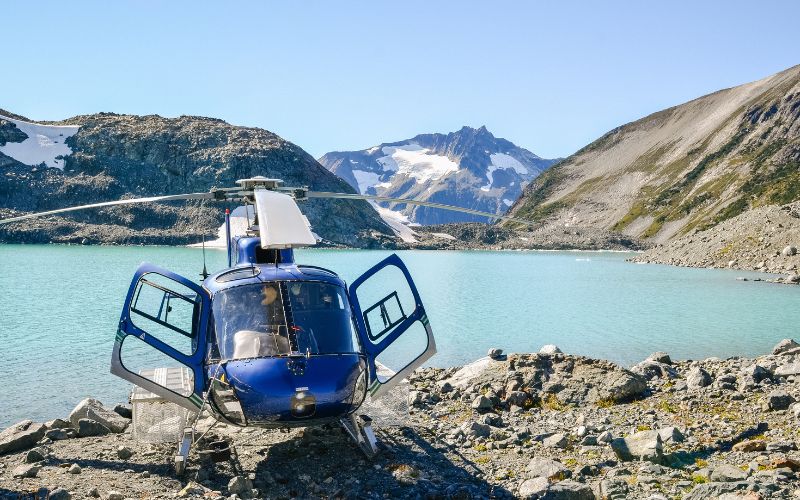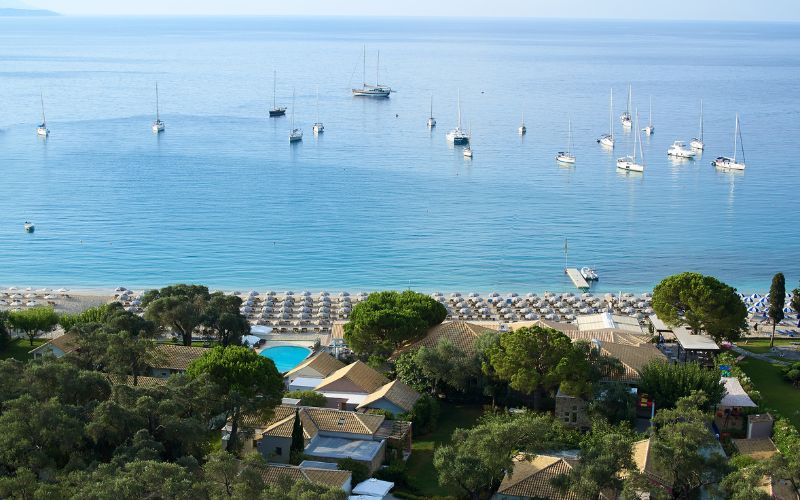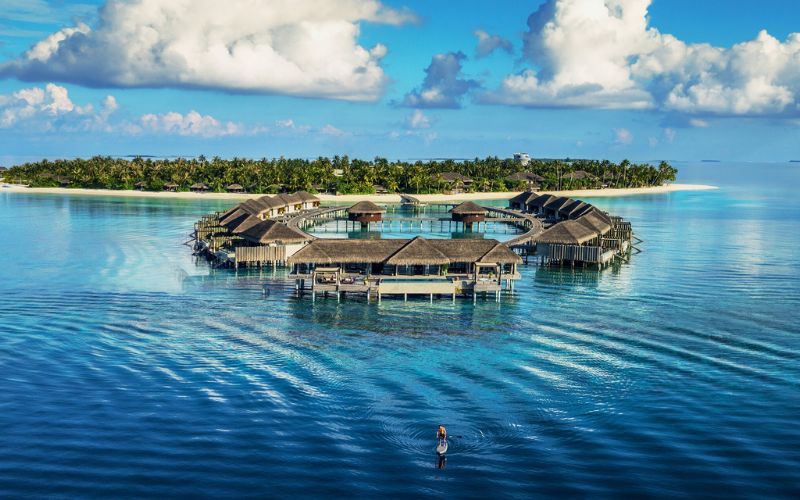Going Further
From exclusive all-inclusives, to the burgeoning long-stay phenomenon and focus on slower travel, April Hutchinson has the lowdown on the luxury travel trends to get on board with in 2023
Splendid isolation
A permanent pandemic hangover is the desire among high-end travellers to stay somewhere in utter privacy. The exclusivity and privacy of a villa or private residence is all in the marketing, with new sub brands popping up to showcase collections.
Small Luxury Hotels of the World has launched Private Collection, for example, featuring a range of properties with privacy at their core, while Luxury Lodges of Australia has rounded up a slew of new and existing villas or private residences within the grounds of its already pretty-exclusive member hotels. Also noticing the trend, luxury and experiential tour operator Audley has created a range of Private Stay accommodation, which includes deluxe lodges and luxury private villas in exotic locations.

There is even a new trade show focused on private escapes, Do Not Disturb, the latest evolution from This is Beyond, creators of Pure Life Experiences. First run virtually last year and in-person this past November, Do Not Disturb is pitched as ‘the global private travel community and event dedicated to space, seclusion and sustainability’.
Touring creativity
Tour operating was probably overdue a shake-up, but the pandemic has fast-tracked tour operators to re-engineer their offerings and how they think: long may their creativity continue into 2023 and beyond.
Carrier’s Flying The Nest product has identified a new opportunity in its ambition to capture the ‘fleeting summer months just before teens strike out in the world by themselves’, combining inspiring destinations with community engagement, such as trips to the Atlas Mountains, where families-with-teens can visit Berber communities.
Dharma – self-styled as ‘a passion-economy start-up that builds original travel brands and talent experiences’ – has created Spirited Stories to offer an immersive insight into the world of wine and spirits with exclusive meet-the-maker events and behind-the-cellar-door experiences in partnership with brands such as Absolut Vodka, Jameson Irish Whiskey and Perrier-Jouët Champagne.
Meanwhile, bespoke travel creator Brown + Hudson is taking the bold step of capping the number of clients it works with, sending no more than 50 travellers per year to any given destination. “Whilst tourism might not be the biggest contributor to climate change, the global industry’s impact is significant,” says Philippe Brown, founder of Brown + Hudson. “We are witnessing its results first-hand. Unprecedented and devastating effects of climate change are already affecting countries that welcome our clients. The industry needs to lead by example.”

The exclusive inclusive
Affluent consumers won’t be feeling the cost-of-living crisis in quite the same way as much of the population, but they still notice price hikes and appreciate value and knowing that costs are locked in. Acknowledging this, many of the world’s high-end resorts are redesigning the all-inclusive concept, but with a new level of style. No longer a dirty word, all-inclusive has become exclusive.

Both IHG Hotels & Resorts and Marriott International have placed a recent focus on this segment. IHG signed a deal with Iberostar Group to give it instant access to a stream of all-inclusive resorts, while Marriott has created an all-inclusive portfolio of 31 resorts across the Caribbean and Latin America, which it intends to grow, particularly the luxury properties.
To appeal to a discerning traveller, resorts need to be both as inclusive and experiential as possible, covering elements such as wellbeing rituals and diving. Dining options need to be just as diverse, from plant-based à la carte restaurants to meals hosted by Michelin-starred guest chefs. It’s also important that a resort still encourages appreciation of life beyond its walls and some are even including guided tours with this in mind.
Floating palaces
Speaking of stunning coastlines: some hotel brands are taking their accommodation a step further and launching completely new cruising offshoots, acknowledging that a luxury life at sea will gain popularity in 2023 and beyond.
The Ritz-Carlton Yacht Collection finally arrived in October, with the launch of Evrima as the first of three yachts to join its portfolio. Four Seasons Yachts meanwhile announced its entry into cruise, and expects the delivery of its first vessel in 2025, an order that includes the option for two additional vessels and amounts to a whopping €1.2 billion. The yachts will apparently boast nearly 50% more living space per guest than currently available, sailing with 95 rooms with a network of joining suite combinations creating ‘villa-like’ residences.
Also embarking on the hospitality expansion at sea is Aman: currently known as Project Sama, with its actual name to be revealed at a later date, the hotelier’s megayacht will launch in 2025. The 183-metre vessel will feature 50 suites, and while its itineraries have yet to be announced, the brand said it will ‘bring the cherished spirit of Aman to the world’s seas and oceans’.
Stay a little longer
Serviced apartments, apart-hotel, extended stay – they all sound so corporate! But hotel operators are jazzing up the category with a bevy of options that offer a more stylish take on the long-stay sector, hailed as the fastest-growing hospitality segment in Europe; Airbnb also says long-term stays are its fastest-growing category.
The pandemic spurred this category on with long-stay offerings which appeal to digital nomads whose boundaries between business and leisure blur. According to a recent report from Stylus, ‘bleisure is back’, with these forecasting experts saying the trend is being led by affluent young professionals in a market that’s set to expand by 19.5% annually until 2032 (Future Market Insights, 2022).

So, how can you lure in these longer-stay bleisure travellers, who tend to be more frequent travellers than the average tourist too? ‘Shrewd hoteliers are reconfiguring guest rooms and public spaces to compete with private rentals for bleisure bookings, as well as incentivising longer stays via discounted packages,’ Stylus reports. These burgeoning spaces are designed to offer business and leisure travellers comfortable retreats for extended stays, combined with cool community spaces and co-working areas.
Take it slow
Given the imperative focus on sustainability as we enter 2023 and a blossoming desire to travel slower and more mindfully, the travel sector will increasingly seek to grow with the trend by appealing to either those who wish to try flight-free, or hanker after the concept of luxuriating in a place for longer and embracing more engaged time with loved ones rather than rushing around.
Byway is the world’s first flight-free holiday platform and aims ‘to bring slow travel into the mainstream’ by offering customisable holidays that take holidaymakers away from the crowds by train, bus, bike and boat. As founder Cat Jones says: “Slow travel is not just about more carbon-friendly ways to travel, it’s about the wider benefits of slowing down and taking the scenic route; taking the time to get to know a place – its food, its landscapes, its people, its histories – and enjoying the freedom and unexpectedness of travelling overland.”
Among those offering slower options is tour operator Sunvil, with a new itinerary to Greece from the UK without setting foot on a plane – you could leave London St Pancras by train and reach Nymfaio in Macedonia three days later, via French countryside, Switzerland, Italy and Croatia’s Adriatic coast.
April Hutchinson is the editor of TTG Luxury, the UK’s leading B2B magazine, website and events portfolio for premium travel professionals
Continue reading Fox Quarterly…
The Next Twelve Months On A Place
The Top Five Luxury Wellness Trends For 2023

